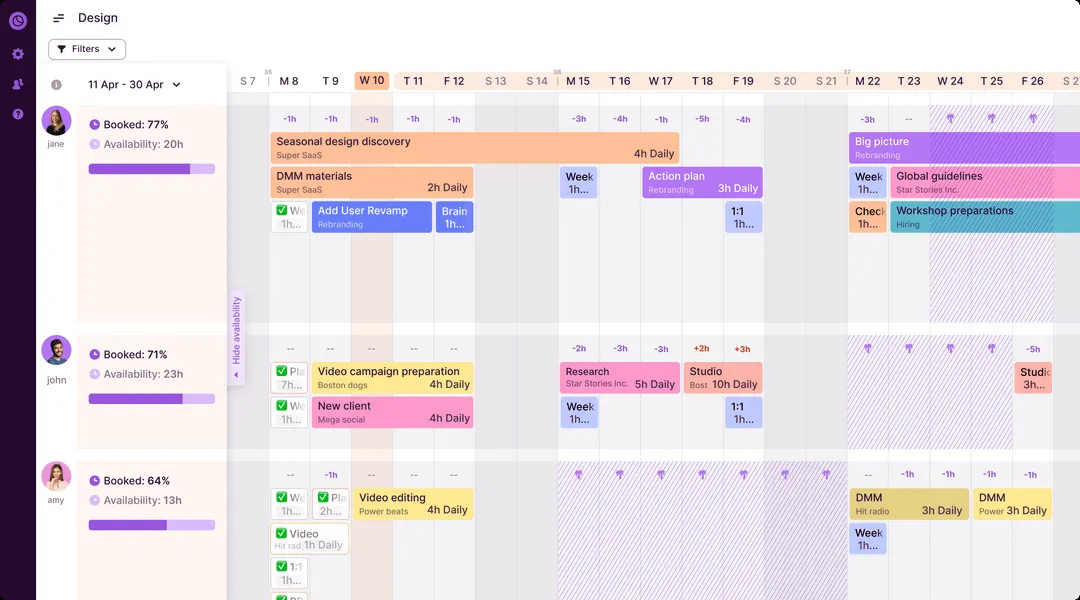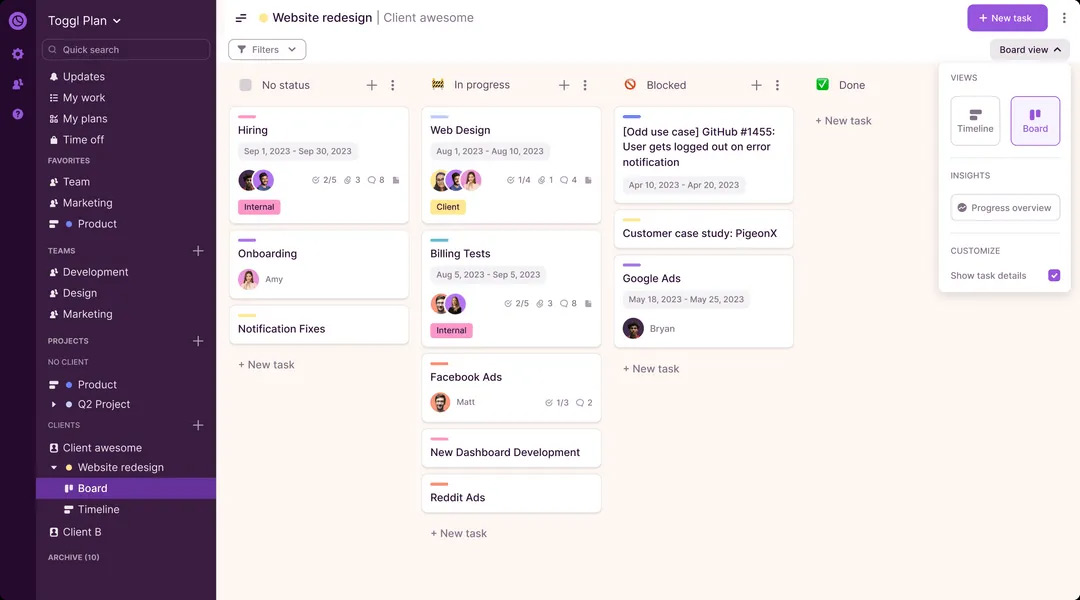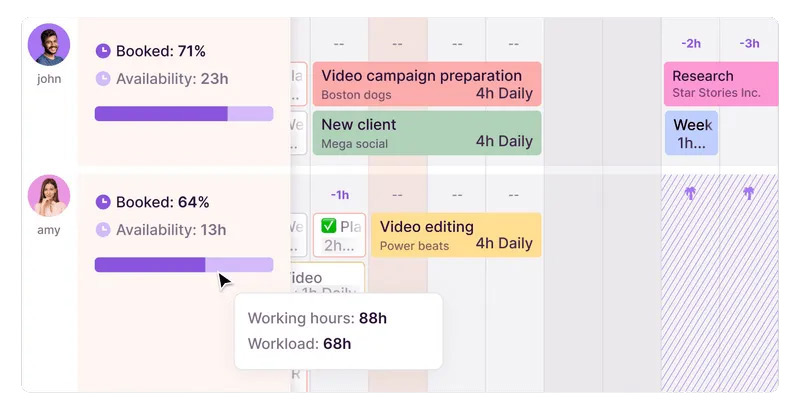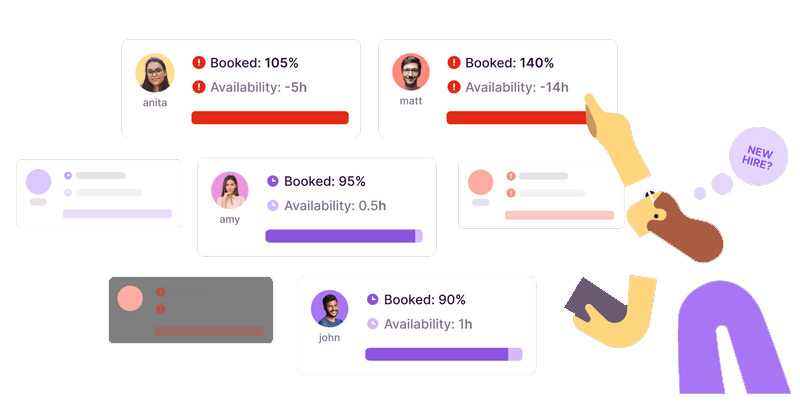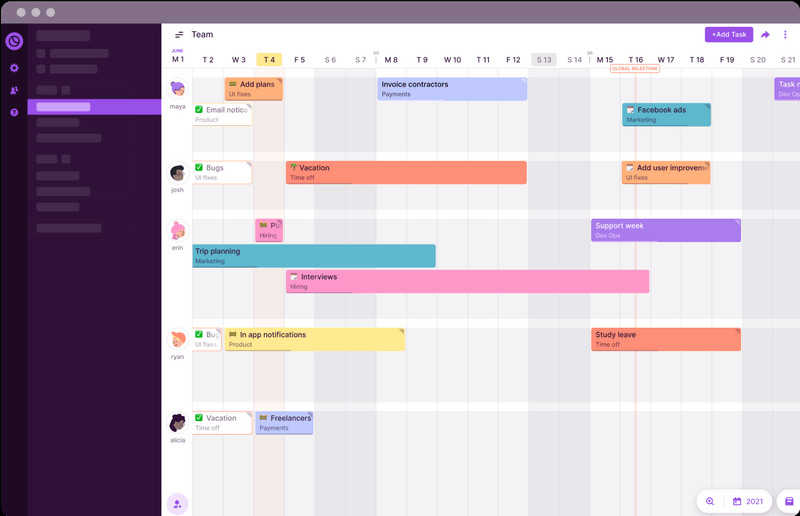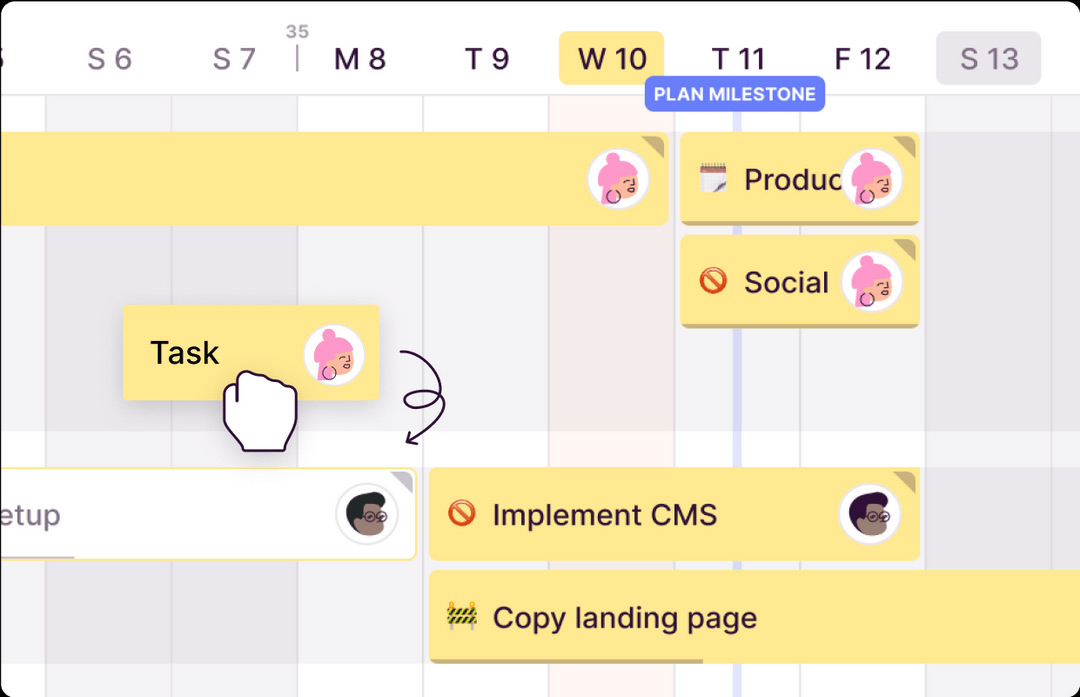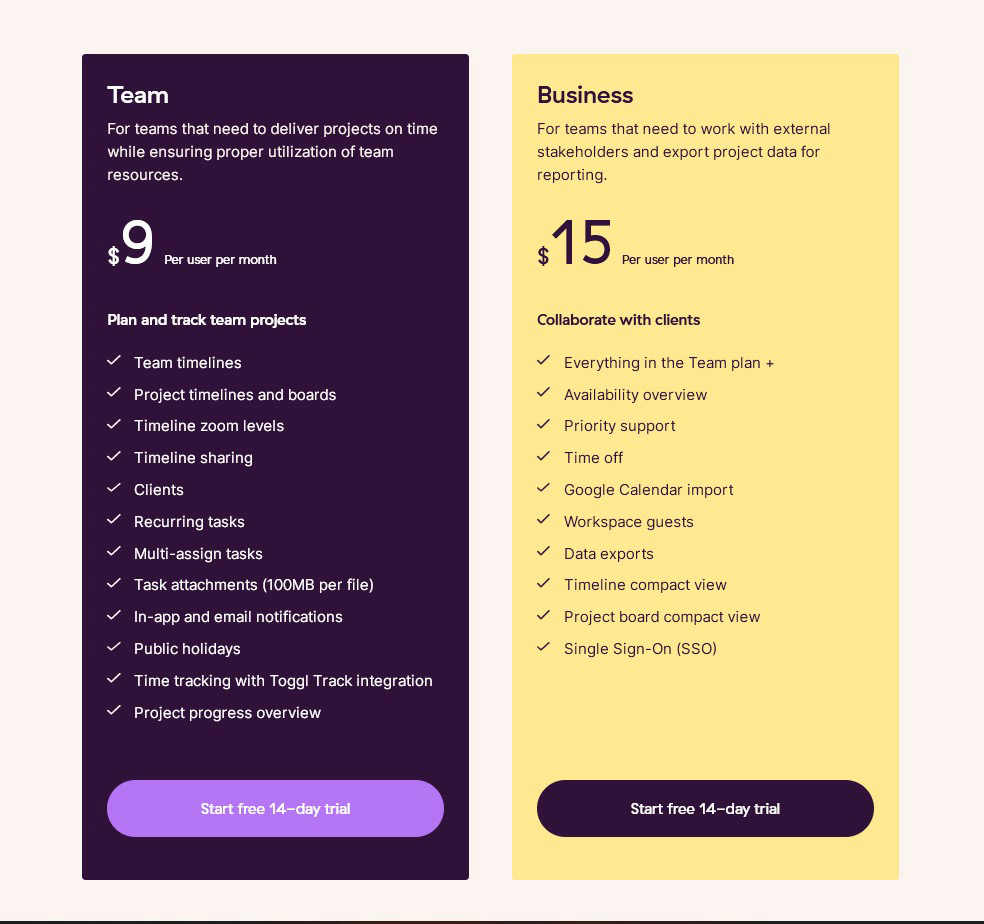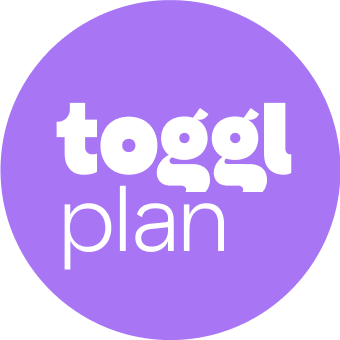
Toggl Plan Review: Pros & Cons
Pros & Cons of Toggl Plan
Pros
Simple, intuitive interface.
Seamless Toggl Track integration.
Visual workload management.
Strong customer support.
Cons
No task automations.
Lacks advanced project tools.
No comprehensive financial features.
Extra cost for time tracking.
Toggl Plan's Standout Features
Toggl Plan stands out because of its lightweight and simplicity. Compared to heavyweights like Microsoft Project or Jira, Toggl Plan offers a clean, intuitive interface that's a breath of fresh air. From my experience testing dozens of similar tools, many of them feel overwhelming, especially for smaller teams. Toggl Plan, however, strikes a good balance. It provides essential features without overcomplicating the user experience. This makes it a good option for teams that need to manage their workload without diving into the complexity of more sophisticated project management systems.
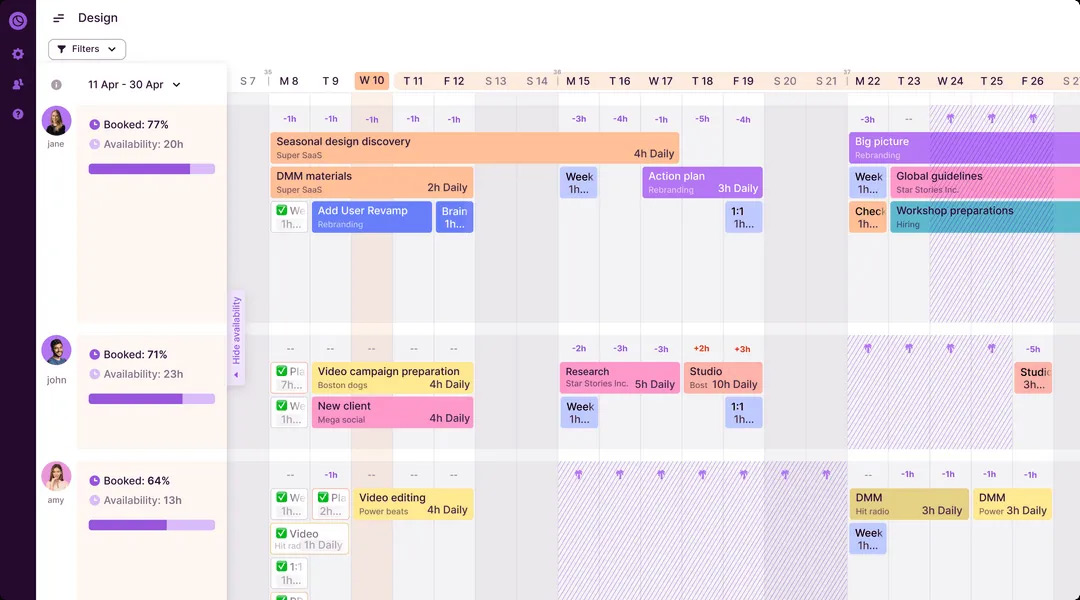
One of the standout features is its integration with Toggl Track. If you’re already using Toggl Track for time tracking, this integration makes Toggl Plan a natural extension. This integration allows teams to easily track time spent on tasks directly from their project plan, which is not always seamless with other tools. For instance, integrating time tracking with project management in tools like Asana or Trello often requires third-party plugins, which can be clunky and unreliable. Toggl Plan’s native integration ensures smooth operation and consistency, simplifying the workflow.
Toggl offers a cohesive suite of tools designed to simplify workflow management. This suite includes Toggl Track for time tracking, Toggl Plan for project management, and Toggl Hire for efficient hiring processes, providing a comprehensive solution for managing time, projects, and recruitment. While Microsoft Project integrates seamlessly with Outlook and Teams, Toggl’s suite is ideal for those prioritizing straightforward time tracking and work management. This suite is especially useful for businesses that are constantly hiring and needing to onboard and train a steady flow of workers who may not stay long-term. By integrating the hiring process with planning and time tracking, Toggl provides a unified solution that helps businesses streamline operations, ensuring that new hires are quickly and effectively brought up to speed. This holistic approach can be particularly beneficial for industries with high turnover rates, making the entire workflow more efficient and cohesive.
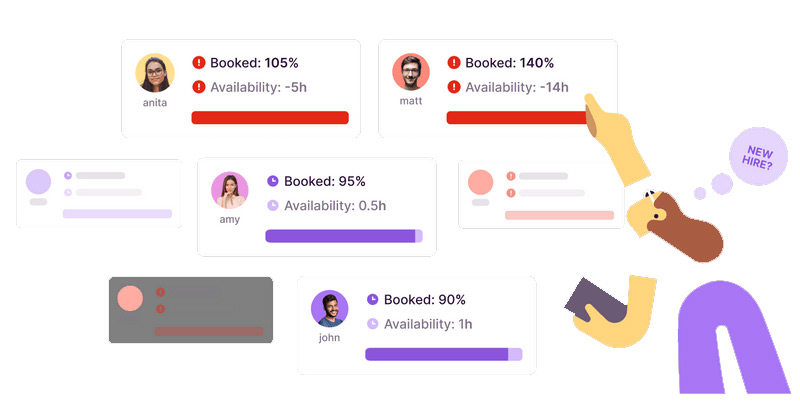
Another standout feature of Toggl Plan is its focus on visual workload management and visual team capacity planning. While these aspects are just a tiny fraction of overall project management, Toggl Plan addresses them more than many traditional project management tools. Visual workload management allows teams to see at a glance how tasks are distributed, track progress, and ensure balanced workloads. Visual team capacity planning helps managers visualize each team member's capacity, making it easier to allocate resources efficiently and avoid overloading or underutilizing anyone. More complex business and pm software that include features like project portfolio management, team communication features, financial forecasting, granular permissions, or corporate and enterprise features do not pay as much attention to these specific areas.
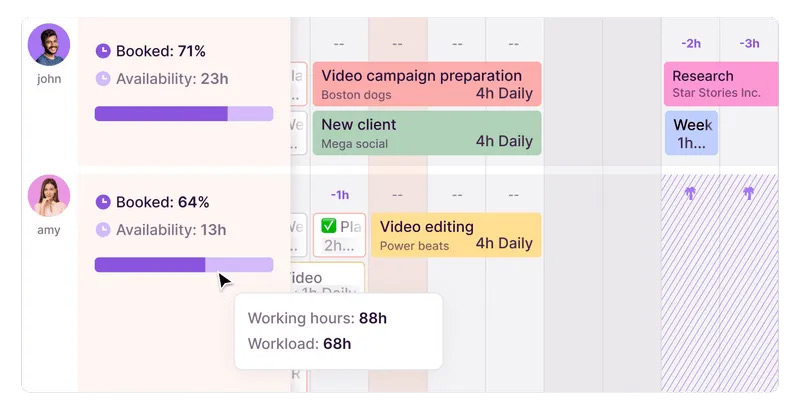
Toggl Plan was developed with small teams in mind, making it lighter and more accessible than many competitors. While tools like Clickup or Wrike offer many features, they can overwhelm a small team or individual looking to manage day-to-day tasks. Toggl Plan’s emphasis on essential features makes it an excellent fit for small teams and freelancers seeking efficient and straightforward project planning.
Who Benefits Most from Toggl Plan
- Freelancers and consultants require tools that are easy to use and don’t add unnecessary complexity to their workflows. Toggl Plan, designed with small teams and individuals in mind, provides straightforward project planning and time tracking. This helps freelancers stay organized and efficiently manage their time across various projects.
- Businesses in industries with high employee turnover, such as retail, call centers, and seasonal workforces, benefit significantly from Toggl Plan. The integration of Toggl Hire with Toggl Plan and Toggl Track allows these businesses to streamline hiring, onboarding, and time tracking. This unified approach ensures new hires are quickly integrated into the workflow, enhancing productivity and reducing administrative burdens.
- Small creative agencies often juggle multiple projects with tight deadlines and small teams. Toggl Plan’s simplicity and essential features make it easy for these agencies to track time, plan projects, and manage client deliverables without the need for complex systems. Its integration with Toggl Track ensures that every billable hour is accounted for seamlessly.
What Users Love About Toggl Plan
Many users love how easy Toggl Plan is to use. The intuitive interface and straightforward navigation make it a favorite among users. One user mentioned, "It is easy to use and has a minimal design that doesn't distract you from your work.," reflecting a common sentiment. Another noted, "It's easy to use, and it's the only one that offers a good visual of how tasks and projects extend over the calendar. This for me is incredibly valuable" This makes Toggl Plan accessible for new users who want to get started quickly with project management and time tracking. The visual aspect of Toggl Plan, particularly the ability to see overlapping tasks, is another feature users rave about. One review highlighted this, stating, "Love being able to see overlapping tasks. Makes complex scheduling easier." This feature simplifies planning and ensures users can easily keep track of multiple tasks, which sets Toggl Plan apart from other tools that may not offer such clear visual timelines.
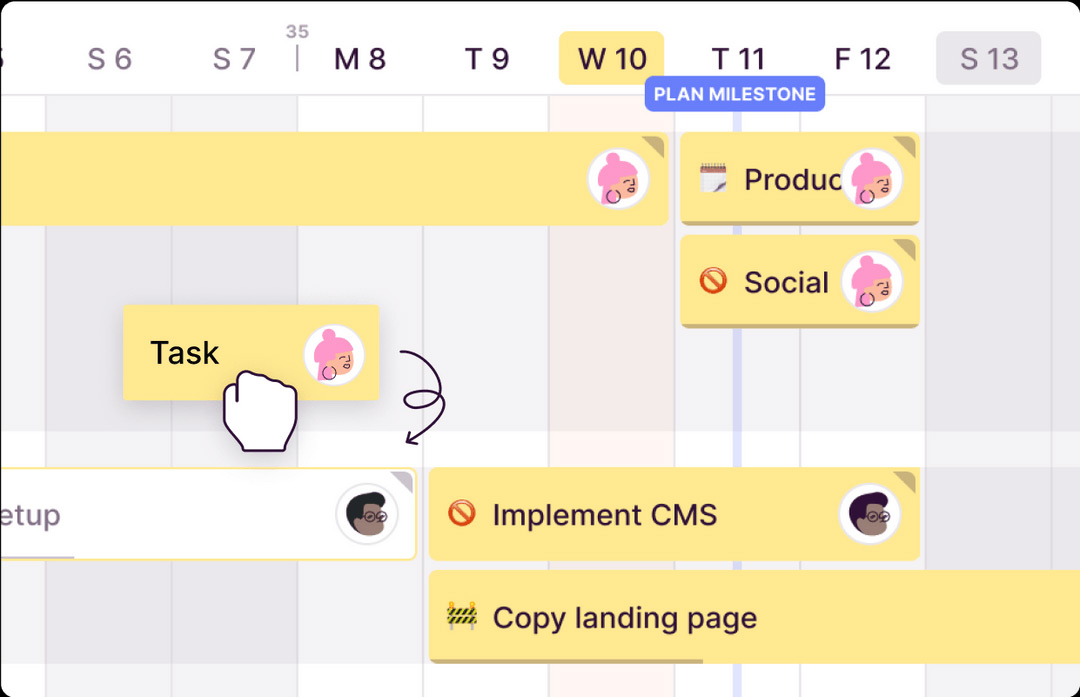
Customer support is another area where Toggl Plan receives praise. Users consistently mention the reliability and helpfulness of the support team. One reviewer shared, "Super easy to use and great support," indicating that the support team is responsive and effective in resolving issues. This aspect is particularly important when users encounter problems that could hinder their workflow. While Monday.com, Notion, and Redbooth face significant criticism for their customer support, Toggl Plan stands out for its exceptional support, making it a preferred choice for users who value reliable and prompt assistance.
The ability to assign multiple team members to a single task is a feature that some users particularly appreciate. This flexibility enhances collaboration and ensures that all aspects of a task are covered by the right people. One user noted how this feature allows for better teamwork and task coverage. Although not all project management tools offer this functionality, Toggl Plan’s inclusion of this feature makes it a preferred choice for teams that require collaborative efforts on their projects. For example, Asana has a notable limitation in that it allows only one assignee per task. This restriction can be cumbersome for teams that rely heavily on collaboration. This is particularly important in projects requiring input from multiple team members. Asana's single assignee model necessitates creating multiple subtasks or using tags to keep everyone informed. This can lead to extra administrative work and potential miscommunication.
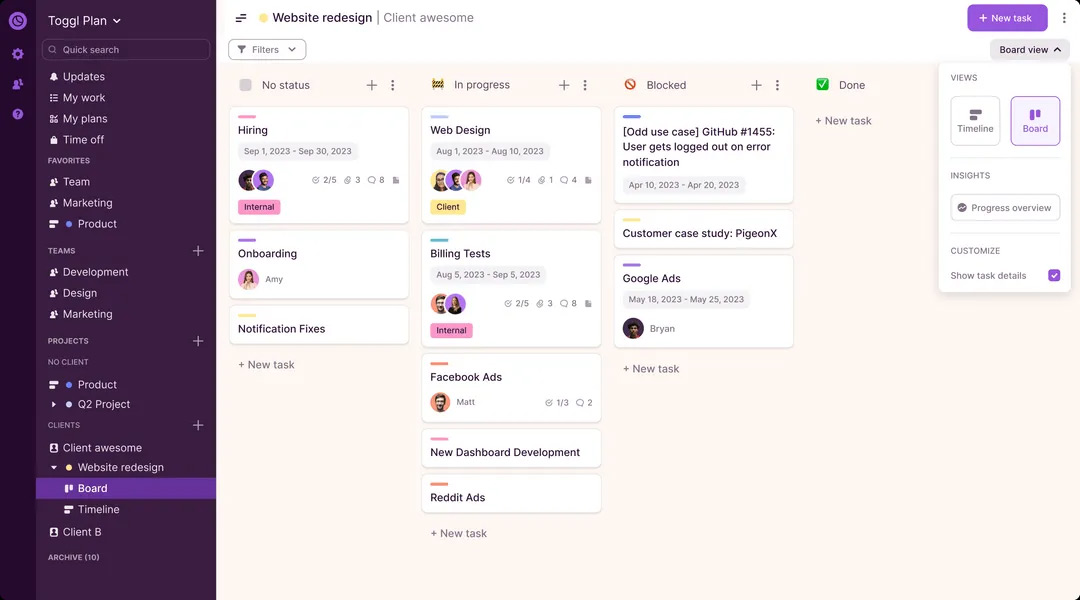
Users also highlight the organizational benefits that Toggl Plan brings to their workflow. One reviewer pointed out, "Toggl Plan tackles the difficulty of scattered duties and uncertain cut-off dates. By providing visual timelines and project control, it keeps initiatives organized and on course."
Top Complaints About Toggl Plan
Many users dislike the limitations in Toggl Plan's feature set. The mobile app, in particular, is a frequent point of criticism. Some users said the app lacks several important features, which significantly reduces its usefulness for managing projects on the go. Additionally, many users have pointed out that Toggl Plan's feature set feels incomplete for advanced project management needs. For instance, one user expressed, "Resource misalignment due to missing critical features makes it harder to track resources effectively."
The incomplete feature set also means that Toggl Plan may not support all the necessary project management activities in a single platform. Advanced project management often requires comprehensive tools for financial oversight, estimation and collaboration. When such tools are missing, as some users pointed out, it can lead to inefficiencies, bottlenecks, and misallocation of team members and other resources.
For example, the inability to export schedules and tasks means that users cannot easily share progress reports or integrate Toggl Plan data with other systems. This feature is crucial for maintaining transparency with stakeholders and for analyzing project performance. Without it, teams might need to spend extra time and effort manually compiling data for reports, which detracts from the time available for actual project work. In contrast, ClickUp provides a robust task data export feature that allows users to easily export tasks, including all associated details and custom fields, into CSV format. This capability is incredibly valuable for teams needing to generate reports. Users can choose to export specific tasks or entire lists, making it flexible for different reporting needs. This functionality helps maintain a high level of transparency and efficiency in project management, simplifying the process of data sharing and integration with other systems.
Some users said the absence of task automation in Toggl Plan is a significant drawback. Automations can save time and reduce errors by automating repetitive tasks such as status updates and notifications. One review noted, "Our workflow could be greatly improved with task automations, which are unfortunately missing in Toggl Plan." This lack of automation means users have to perform many manual updates, which can be time-consuming and prone to mistakes.
Toggl Plan vs. The Competition
Toggl Plan offers a lightweight and straightforward approach to project management, focusing on essential features without overcomplicating the user experience. Its visual workload management and team capacity planning are particularly strong, allowing users to see task distribution and team capacity at a glance.
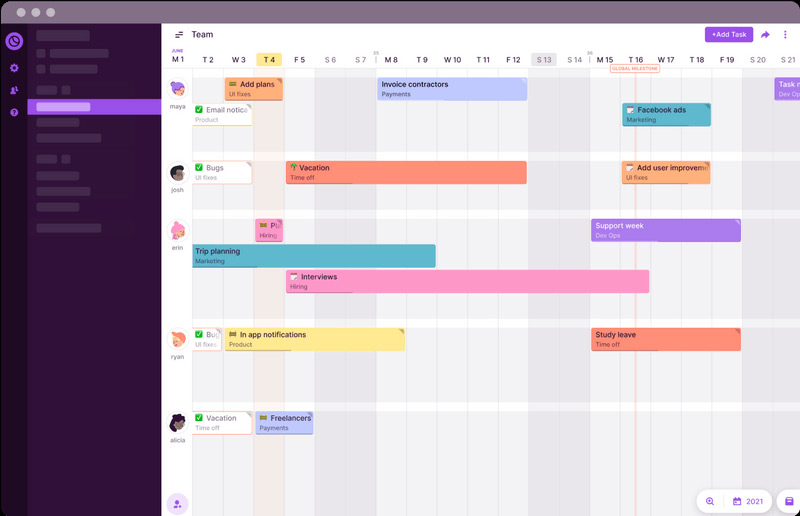
While Trello, ActiveCollab, and Asana also prioritize user-friendliness, Toggl Plan’s integration with Toggl Track for time tracking and its emphasis on visual planning set it apart. Trello’s simplicity and visual board system are excellent for basic task organization but may lack the depth of Toggl Plan’s visual planning tools.
ActiveCollab offers a minimalist interface that focuses on simplicity but comes with very limited customization options. Users can manage tasks and time tracking efficiently, but the lack of customization can be a drawback for those needing more tailored solutions. Additionally, ActiveCollab allows only one assignee per task, which can limit collaboration within teams. In contrast, Toggl Plan’s simplicity combined with visual planning and flexible integrations makes it a more versatile tool for small teams.
Asana is known for its visually pleasing interface, which enhances the user experience with clean, intuitive design elements. However, Asana shares the same disadvantage as ActiveCollab with its limitation of assigning only one person per task. This can hinder collaboration in teams where multiple members need to work on the same task. Additionally, Asana’s cost can be higher compared to other tools.
Toggl Plan and Paymo are well-suited for small teams and freelancers. Toggl Plan’s simplicity and essential features make it easy for small teams to manage projects and track time without the complexity of more advanced tools. Paymo integrates time tracking and invoicing seamlessly, providing a straightforward solution for freelancers managing multiple clients and projects. Both tools offer user-friendly interfaces and essential features that cater to the needs of smaller teams and independent professionals. Paymo’s time tracking features are seamlessly integrated into its project management functionalities. This ensures that billable hours are captured precisely, which is crucial for freelancers and small businesses managing multiple clients. Additionally, Paymo’s built-in invoicing feature allows you to generate professional invoices directly from time entries, simplifying the billing process. For small teams seeking a solution that includes advanced time tracking features, Paymo should be the first alternative to try if you're looking for a more integrated approach compared to the separate tools of Toggl Plan and Toggl Track.
Basecamp, like Toggl Plan, offers a user-friendly interface and excels in facilitating team communication through features like real-time group chat and organized message boards. Basecamp also provides automatic check-ins, which help keep everyone informed and accountable. However, Basecamp's flat pricing model, while advantageous for large teams, may not be as cost-effective for smaller teams compared to Toggl Plan.
Podio and ClickUp excel in customization capabilities. Podio’s high degree of flexibility allows users to create customized workspaces and applications with minimal coding, making it suitable for unique business processes. ClickUp is praised for its unparalleled customizability, offering extensive personalization across various aspects of the platform. Both tools are ideal for users who need a tailored project management solution that can adapt to their specific workflows.
Wrike is a pm tool that complements Toggl Plan’s weaknesses. Wrike offers advanced project management features suitable for larger teams and complex projects. Its robust reporting and customization options, along with seamless integration capabilities, provide a more comprehensive solution where Toggl Plan might fall short. Wrike's ability to handle detailed and large-scale projects without syncing problems makes it a strong alternative for users needing more advanced functionalities and integrations.
When looking for project management tools suitable for large, complex projects to Toggl Plan, several stand out: Microsoft Project, Jira, Scoro, Kantata, and Monday.com. These tools offer advanced features and integration capabilities that exceed Toggl Plan's simpler, more streamlined approach designed for small teams. Microsoft Project excels in detailed project planning with its advanced Gantt charts and resource management, providing a level of depth and precision not found in Toggl Plan. Jira is particularly strong in software development environments, supporting Agile methodologies with extensive bug tracking and thicketing, which are more useful for software development teams than Toggl Plan's visual workload management approach. Scoro offers a comprehensive suite tailored for large enterprises, including task and financial tracking, making it far more suitable for corporate needs than Toggl Plan. Kantata blends the strengths of Mavenlink and Kimble Applications to offer detailed project oversight and advanced resource management, features that go beyond Toggl Plan's capabilities. Lastly, Monday.com provides a highly customizable and visually appealing interface with robust workflow automation features that are not available in Toggl Plan. While Toggl Plan is ideal for smaller teams seeking simplicity and ease of use, these alternatives cater to the demands of larger, more complex projects with their extensive feature sets and integration capabilities.
Price and Cost Comparison
Toggl Plan offers a variety of features across its pricing tiers. The Free Plan provides basic task management and timeline views for individuals. The Team Plan, at $9 per user/month, enhances collaboration with unlimited tasks, advanced planning tools, and integrations with other software. The Business Plan, at $15 per user/month, includes priority support, custom export options, and dedicated account management, suitable for larger teams needing more robust project management capabilities.
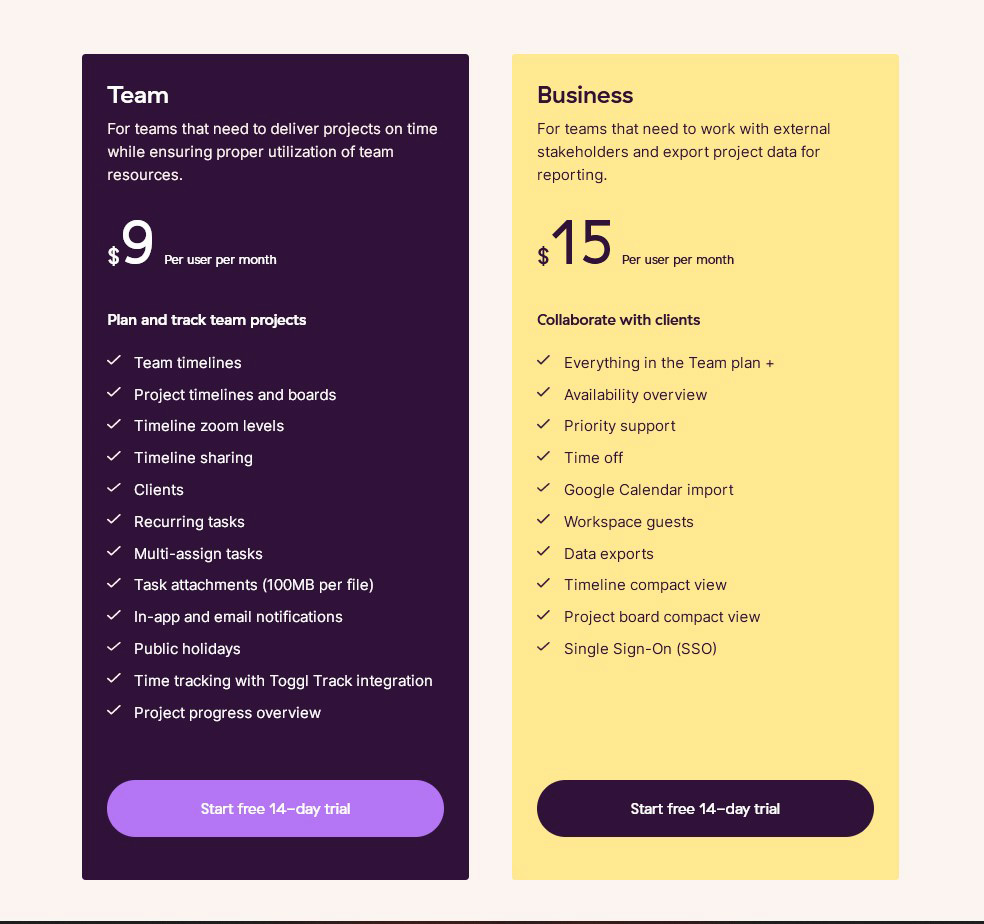
More budget-friendly options include Freedcamp, Paymo, Trello, and Notion. Freedcamp’s unmatched free plan includes unlimited users, projects, and storage, with paid plans starting at $1.49 per user per month when billed annually, making it significantly cheaper than Toggl Plan. Paymo starts at $5.9 per user per month, making it a more affordable choice than Toggl Plan. It offers time tracking and invoicing, features often found in higher-priced plans of other tools. Trello's Standard plan is $5 per user per month, providing a cost-effective alternative with its basic project management capabilities. Notion’s paid plans start at $8 per user per month, matching Toggl Plan’s price but focusing more on a personal-centric approach to project management with note-taking at its foundation.
Moderately priced options include ActiveCollab, Redbooth, and Wrike, which are close in price to Toggl Plan. ActiveCollab’s most basic package is priced at $8 per user per month, offering stopwatch and project-level time tracking, though it lacks severely in the customization section. Redbooth offers a Pro plan at $9 per user per month, a bit more expensive than Toggl Plan, targeting mid-sized teams with more communication features and video call capabilities. Wrike’s Professional plan costs $9.80 per user per month, slightly higher than Toggl Plan, but it includes more advanced task management features.
More expensive options include Asana, Monday.com, Scoro, and Podio. Asana starts at $11 per user per month, making it more costly than Toggl Plan. This higher price is justified by its extensive range of features, including task allocation, scheduling, advanced reporting, and integration capabilities, which cater to various project management needs. Monday.com also starts at $11 per user per month. Like Asana, Monday.com is positioned at a premium price point due to its comprehensive toolset. This includes features for task management, automation, and extensive integration options, making it suitable for both small and large teams requiring advanced functionalities. Podio’s pricing starts at $11.20 per user per month for the Basic plan, which includes essential task management features. The Plus plan, which introduces automated workflows, is priced at $20 per user per month. Podio's pricing structure is on the higher end due to its advanced project management features and the distinction between employee and external user costs, which can add up if you have a large team.
Toggl Plan’s Privacy & Security
When using Toggl Plan, your privacy and security are well-guarded. Toggl Plan ensures that your personal and project data are handled with the utmost care and protection. Here are the key points you need to know:
- Toggl Plan complies with the GDPR, ensuring that all data handling practices are up to European standards. Your data is encrypted both in transit and at rest, using industry-standard encryption protocols. This means that even if data is intercepted, it cannot be read or misused by unauthorized parties.
- Your data is stored on secure servers located in the European Union, managed by reputable third-party providers who are also GDPR-compliant. This regional storage ensures that your data benefits from strong legal protections.
- Toggl Plan implements strict access controls. Only authorized personnel can access your data, and this access is regularly reviewed and audited to prevent unauthorized use. Users also have the ability to manage permissions within their own teams, ensuring that sensitive information is only accessible to those who need it.
Compared to other project management tools like Asana and Trello, Toggl Plan stands out in its transparent data handling practices. While many competitors also comply with GDPR and offer encryption, Toggl Plan provides clear and detailed documentation on their privacy practices, which can be reassuring for users concerned about data security.
Users of Toggl Plan have significant control over their data. You can request data deletion, access your data, and correct any inaccuracies. This level of control is comparable to industry leaders but is presented in a straightforward and user-friendly manner.
Toggl Plan's Update Frequency
Toggl Plan is known for its consistent quarterly updates, which introduce a variety of new features and improvements. In 2023 alone, significant updates included mobile task scheduling enhancements, time tracking improvements, and new integrations like Google Calendar sync. These regular updates ensure that users have access to the latest functionalities, helping them plan and track projects more efficiently
ClickUp is particularly notable for its near-weekly updates, which may overwhelm some users due to the volume and speed of changes. Monday.com also updates almost weekly, maintaining a very dynamic development pace. Hubstaff, with around 20 updates in 2023, also shows a higher-than-average frequency, exceeding the typical once-a-month benchmark.
Several tools maintain a consistent update schedule of about once a month. This includes ActiveCollab, Basecamp, Jira, Kantata, Microsoft Project, Paymo, Scoro, TrackingTime, Trello, and Wrike. These tools provide regular monthly updates.
Notion tends to update every few months, which is less frequent compared to the monthly updates of many other tools. Freedcamp and Podio have less transparency and regularity in their update schedules, making it challenging to track their development progress.
Toggl Plan, on the other hand, releases updates on a quarterly basis. This places it in the lower-frequency category, updating less often than many competitors but still ensuring significant improvements and new features periodically.
Toggl Plan Company History
Toggl Plan, part of the Toggl suite of products, was established in 2017. Initially launched as a part of Toggl, a time-tracking tool, it quickly developed its own identity and purpose. The aim was to simplify project planning and management for teams of all sizes.

Despite its relatively recent entry into the project management scene, Toggl Plan has gained a reputation for being a reliable and efficient tool. Its development is backed by the experience and expertise of the Toggl team, which has been creating productivity tools since 2006. This strong foundation has enabled Toggl Plan to grow and adapt quickly.
Established Veterans (1990s to early 2000s):
Microsoft Project, a staple in project management software, debuted in 1984. This early launch places it among the very first tools designed to help manage and streamline project planning and execution. Basecamp, originally known as 37signals, was founded in 1999. The company initially began as a web design firm before shifting its focus to developing a project management tool in 2004. Jira, developed by Atlassian, was launched in 2002 and has become one of the most widely used tools for software development and project management globally.
Mid-2000s Entrants:
ActiveCollab was founded in 2006, making it one of the veterans in the project management software industry. Wrike, also founded in 2006, was initially created to streamline business processes and improve collaboration, with its headquarters in San Jose, California. Asana, an American software company, was founded in 2008 by Dustin Moskovitz and Justin Rosenstein. Commercially launched in April 2012, Asana has a significant history of continuous development. Paymo, founded in 2008, has evolved to offer a comprehensive suite of tools designed to help small and medium-sized businesses manage their projects efficiently. Redbooth, also founded in 2008, boasts notable longevity in the project management software arena. Mavenlink, founded in 2008, merged with Kimble Applications to form Kantata in 2022, bringing together their extensive experience in professional services automation.
Early 2010s Developments:
Trello was initially developed by Fog Creek Software in the summer of 2010, officially launching in 2011. By 2014, Trello became its own company, and in 2017, it was acquired by Atlassian. Podio, founded in 2009 in Denmark, was acquired by Citrix in 2012. Freedcamp's story begins in 2010 when Angel Grablev envisioned making project management accessible and affordable for all. Hubstaff, established in 2012, started as a fully remote company creating a tool for better time management. Monday.com, which started as dapulse in 2012, rebranded and launched with a focus on task management and communication.
Recent Players (mid-2010s and later):
ClickUp, born in 2012, was publicly launched in 2014 and quickly evolved from an internal tool to a comprehensive project management platform. Notion, founded in 2013, has made significant strides in the productivity software market. Scoro, also founded in 2013, focuses on corporate-level project management with comprehensive financial tools. Flowlu, active since 2018, is one of the newer entrants in the field. Kantata was established in 2022 through the strategic merger of Mavenlink and Kimble Applications, combining their expertise.
Toggl Plan, established in 2017, stands out as a relatively new player in this diverse landscape. Despite its youth, it benefits from the experience of the Toggl suite, which has been developing productivity tools since 2006.
The Final Verdict on Toggl Plan
Toggl Plan stands out for its simplicity and ease of use, making it an ideal choice for small teams, freelancers, and businesses with high turnover rates. Its visual workload management and seamless integration with Toggl Track for time tracking enhance project planning without overwhelming users with unnecessary complexity. While it lacks some advanced features found in tools like ClickUp or Asana, its straightforward design and essential functionality make it a practical option for those seeking a reliable, no-frills project management tool. Users appreciate its intuitive interface, visual timelines, and strong customer support, although the mobile app's limitations and lack of automation can be drawbacks. Overall, Toggl Plan offers a balanced approach to project management, prioritizing usability and essential features over an extensive but potentially overwhelming feature set.
Written by Remus Zoica
